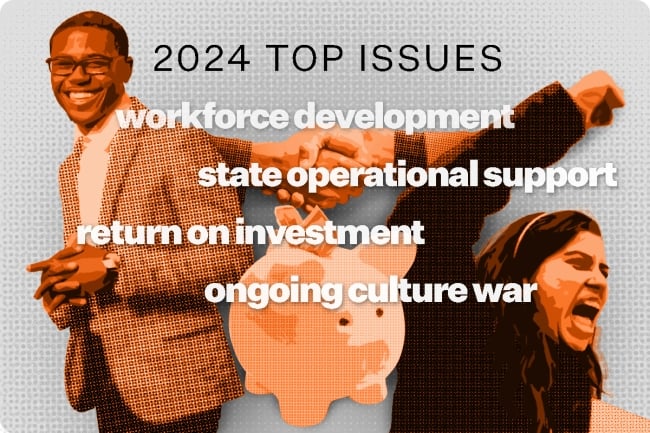You have /5 articles left.
Sign up for a free account or log in.

Some of the top policy priorities outlined by state higher ed officials in a new survey include workforce development, state funding and return on investment.
Photo illustration by Justin Morrison/Inside Higher Ed | Rawpixel
As many state legislatures return to session this month, lawmakers are expected to tackle various higher ed issues, including economic and workforce development, college costs, calls for increased funding, and hot-button topics such as diversity, equity and inclusion programs and free speech and hate speech.
Policy experts anticipate these key issues will converge in statehouses across the country.
“Each state is obviously going to have its own way that these interests converge within the context of their governments and institutions, but most states are going to have similar types of challenges,” said Ben Cecil, senior education policy adviser at Third Way, a center-left think tank.
A new report released by the State Higher Education Executive Officers Association on Jan. 4 confirms such predictions. Its findings, based on a survey of state higher education officials’ top policy priorities for the new year, indicate they share many of the same concerns.
They identified as their prime concern offering and creating academic programs that address local, regional and statewide economic and workforce development needs. State funding levels and ensuring colleges provide the educational benefits that students pay for and expect were listed as their second and third priorities, respectively. Other overlapping issues such as affordability, college completion and public perception were also among their top 10 concerns. Completion of the Free Application for Federal Student Aid and institutional accountability and effectiveness tied for 11th place.
“These are a lot of very interconnected issues,” Cecil said. “It’s kind of like, which side of the Rubik’s Cube are we trying to solve first?”
Equipping the Workforce
This was the second year in a row that economic and workforce development ranked first in the report.
Labor shortages driving this focus are uneven across industries, but U.S. Bureau of Labor Statistics data indicate there are about 8.7 million unfilled jobs nationwide. The gap stems from a variety of factors, including an uptick in retirements among baby boomers, lower birth rates and a pandemic-era slowdown in immigration.
“Governors and legislators are always looking for ways to grow the state’s economy,” said Tom Harnisch, vice president for government relations at SHEEO and a lead author of the report. “So higher education has a key role in helping them meet the state’s economic development needs.”
That role has grown in recent decades, according to SHEEO.
“That’s all tied to the increasingly knowledge-based economy,” Harnisch said. “States know if they are to be competitive they have to have the best-educated workforce.”
Harnisch and others anticipate state lawmakers will introduce a variety of bills this session in an attempt to address labor shortages and increase the number of trained and educated people in the workforce, through a variety of legislative initiatives ranging from mandated apprenticeship programs to partnerships between colleges and major corporations and even tying institutional workforce-outcome metrics to state appropriations levels.
“I think state lawmakers are well past starting to see postsecondary education as a workforce-development strategy,” said Austin Reid, senior legislative director for education policy at the National Conference of State Legislatures, or NCSL.
More states are also starting free college programs, often called promise programs, including those designed for adult students, as yet another way to address gaps in the state workforce. Adult and nontraditional students’ success were cited among the top 10 priorities for the first time this year, according to the SHEEO report.
“We’ve seen a lot of interest and investments in alternatives to the four-year bachelor’s degree,” said NCSL associate director Sunny Deye. These include short-term or nondegree credentials and associate degrees—programs that lead to the middle-skill jobs where states are experiencing the greatest shortage of workers. “Legislators very much understand that creating various pathways to get people into those positions is now part of the higher education system."
Regulating Return on Investment
The return on investment of specific degrees and/or certifications is also likely to be up for discussion in many state legislatures.
“If we want policymakers and students alike to invest in higher education, then we really need better data on what the return on investment is going to be,” said Sean Tierney, director of research and policy at the Institute for Higher Education Policy.
The question for lawmakers is how to measure the value of higher ed. Tierney believes many states should invest in their data infrastructure—which is often underfunded—to get more accurate state- and industry-specific numbers.
“We live in a very data-driven world, but funding for higher education data systems … has not kept pace,” he said. “Regulating ROI data is still a significant positive direction. We just need to make sure that we have the funding levels that would be required.”
Colorado and Texas have already established a minimum required ROI, and both states issue annual reports on which programs do and do not meet the threshold. Tierney anticipates that more states will follow suit with similar practices or policies.
Chief executives of state higher ed governing, policy and coordinating boards say they’ll need state support to fund such initiatives. Nearly 80 percent of the survey respondents ranked state operational support as very important, up from about 70 percent last year.
Many states had budget surpluses in 2023, and most were still distributing the last of state and/or federal pandemic relief funds. The report’s authors note that the sustainability of these surpluses “remains an open question” and that college leaders face inflation pressures. Still, the report said, 2024 budget prospects were positive in most cases.
Continuing Culture Wars
Ongoing campus culture wars that occurred have already begun to roll over into the new legislative sessions.
A Republican lawmaker in Kentucky filed a new anti-DEI bill on the first day of the state’s legislative session. The bill would prohibit instruction that promotes the belief that some individuals are “inherently privileged” or any teaching that suggests all “Americans are not created equal.” It differs from other bills passed in states such as Texas and Florida, however, by limiting the mandate to “noncredit classes, seminars, workshops, trainings and orientations.”
Jeremy Young, senior manager of free expression and education at PEN America, a free expression advocacy group, said he anticipates the introduction of other “divisive concept bills,” which list concepts that can’t be taught in the classroom or spoken about at campus-sponsored events. These include not only anti-DEI bills but also those restricting gender and sexuality studies as well as support for Palestinians in the context of the Israel-Hamas war.
“We’re seeing an endless proliferation of censorship, and higher education increasingly seems to be the primary focus for this, even above and beyond K-12,” Young said. “Education leaders and advocates cannot be too concerned.”
“It really is an incredibly dangerous way to treat American higher education, which is the crown jewel of the educational system,” he added.
Building on Federal Policy
Another policy issue that was not included in the survey but that Reid of NCSL cited as a likely area of lawmakers’ focus is states’ role in student loan regulation and forgiveness.
He said the angle from which states approach loans may shift in 2024 following a year of “historic levels of new programs and regulations” by the U.S. Department of Education.
“There was probably some interest among state legislators around the president’s plan to forgive debt,” Reid said. “But knowing that that’s not coming through, there may still be some interest in trying to figure out, could there be targeted loan-forgiveness programs at the state level?”








